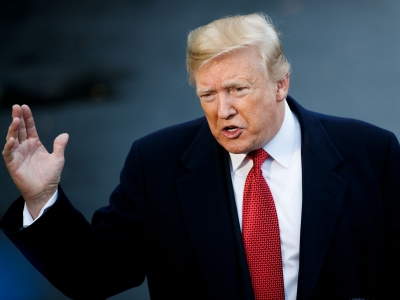US risks alienating India - a partner it can ill afford to lose: Report
By IANS | Updated: August 7, 2025 16:54 IST2025-08-07T16:47:20+5:302025-08-07T16:54:54+5:30
New Delhi, Aug 7 US President Donald Trump's tariff hike on Indian exports over New Delhi's decision of ...

US risks alienating India - a partner it can ill afford to lose: Report
New Delhi, Aug 7 US President Donald Trump's tariff hike on Indian exports over New Delhi's decision of buying Russian oil has rekindled simmering tensions between two nations, a report highlighted on Thursday.
"For two decades, the US has invested in the idea of India as a natural counterweight to China. But through a pattern of strategic missteps—marked by economic nationalism, diplomatic coercion, and inconsistent standards—Washington risks alienating a partner it can ill afford to lose," a One World Outlook report titled 'How to Lose an Ally Over 50% Tariffs' detailed.
The US-India ties, as envisioned by American policymakers, was aimed at achieving a strategic goal of containing China's rise in Asia.
"From George W. Bush to Barack Obama, from Trump to Biden, there has been rare bipartisan consensus in Washington around India’s centrality to a free and open Indo-Pacific. This has manifested in various ways — defence cooperation, technology partnerships, joint naval exercises, and frameworks like the Quadrilateral Security Dialogue (the Quad) and the recently introduced TRUST and COMPACT initiatives," it stated.
In 2024, the US and India signed a 10-year defence roadmap and launched plans for joint innovation and supply chain integration. The two nations set trade targets at USD 500 billion. India's big market, growing tech sector and military modernization were not just seen as opportunities but as necessities to counter China's regional dominance.
"Though the bilateral partnership seemed robust on paper but in practice, it repeatedly stumbled against three core barriers - India’s strategic autonomy, US' double standards and economic nationalism of two nations. The difference of opinion between two nations over purchase of Russian oil is not just a policy disagreement but a symptom of deeper malaise," the report mentioned.
India, it said, has chosen multipolar engagement while resisting alignment with global powers since 1947 which showcases in how New Delhi currently maintains defence ties with Russia, economic relations with China and strategic cooperation with US while refusing refusing to subordinate its decisions to any singular power bloc.
When US wants to pressurise India by imposing sanctions for importing Russian oil, it misjudges New Delhi's willingness to compromise its principles for bilateral ties. US coercion causes distrust instead of drawing India closer as the latter considers such moves infringements on sovereignty, the report stated.
"The most damaging aspect of the current US approach is its hypocricy as the Trump administration has increased tariffs on India for buying Russian oil while chosing to 'pause' tariffs on Chinese imports even as Beijing continues to buy oil from both Russia and Iran. The Trump administration is being seen as glaring double standard by observers in Inda and beyond. The decision signals US' willingness to compromise with adversaries when expedient, while lecturing allies when convenient.
"Over the past 10 years, India and the US have been following inward-looking economic policies, increasing tariffs, tightening market access, and pushing for domestic self-reliance. It reflects in Prime Minister Narendra Modi’s "Atmanirbhar Bharat' campaign while it is 'Make America Great Again' (MAGA) for Trump. The problem emerges when nationalism of two nations collides with partnership," One World Outlook reported.
Trump's tariff increase on Indian exports, targeting products like pharmaceuticals, textiles, and auto parts will not just affect Indian producers but also American consumers and firms who depend on affordable imports. In response to Trump administration's actions, India may restrict US companies access to its growing tech sector, delay defence procurements, or choose alternate partners, the extensive report mentions.
Disclaimer: This post has been auto-published from an agency feed without any modifications to the text and has not been reviewed by an editor
Open in app